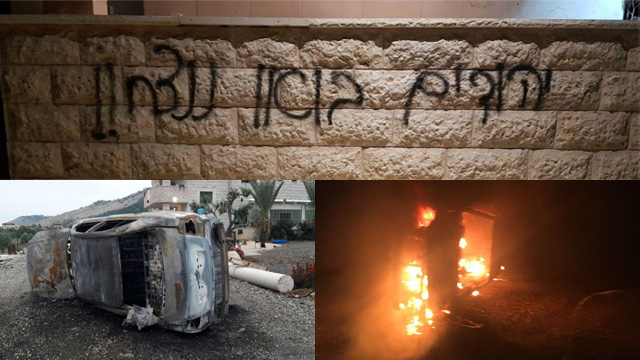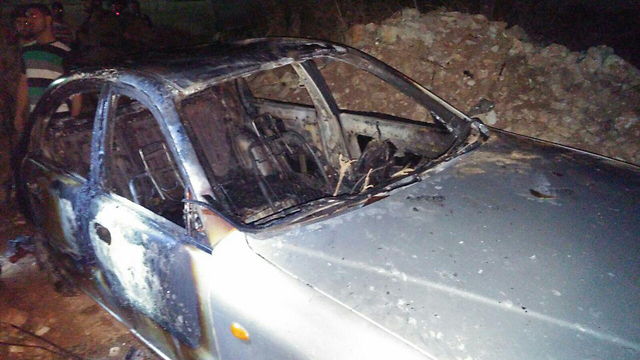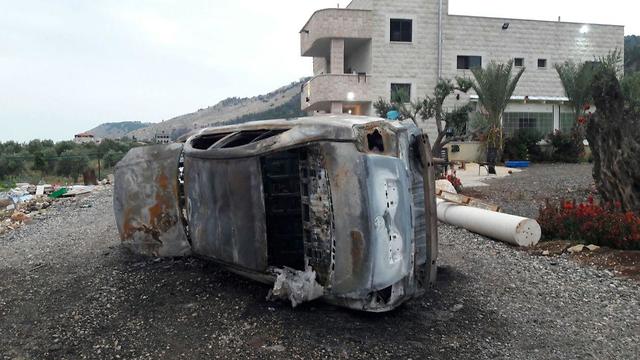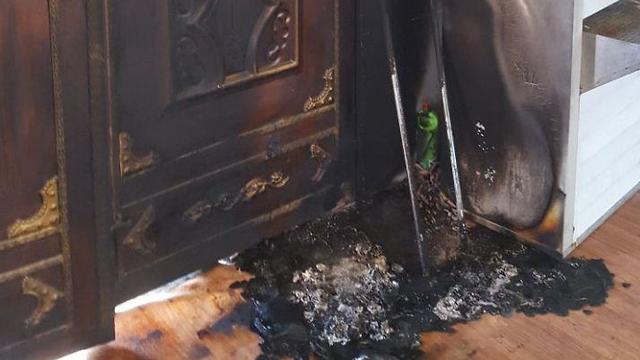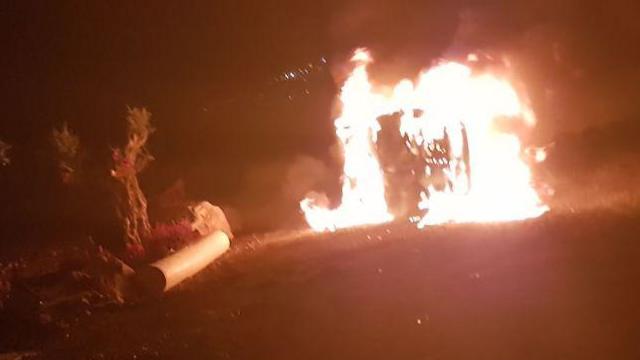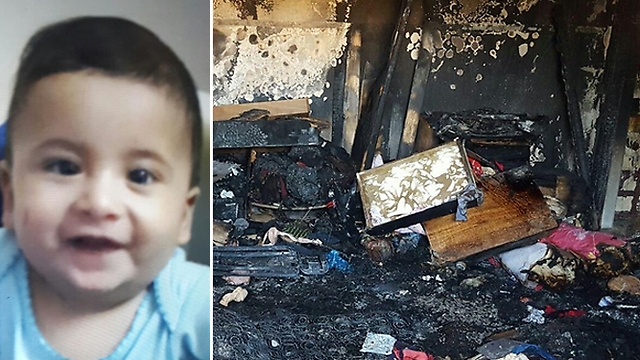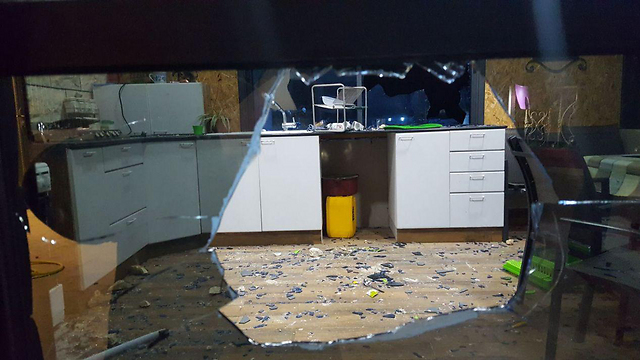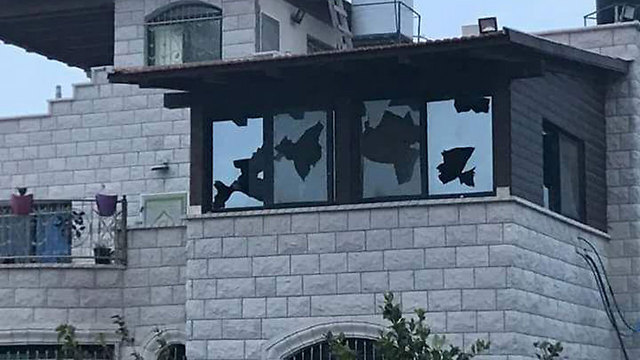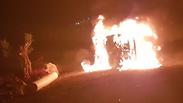

Defense establishment girds for price tag attacks in midst of combustible week
On heels of deadly clashes on Gaza border, US Embassy move, security officials fear price tag attacks could also cause conflagration in relatively tranquil West Bank; 18 price tag incidents took place since year's beginning, 16 incidents in which IDF soldiers were attacked by settlers; security official: 'Next stop is burning down houses'; Yitzhar official decries 'spins over Duma case.'
The recent surge in price tag attacks by right-wing extremists against Palestinians—the latest taking place in the village of Iksal in the north two and a half weeks ago—has led the IDF, the Shin Bet and the Shai (West Bank) District Police to prepare for similar incidents in what is expected to be the most volatile week in years.
The possibility of such attacks occurring was at the center of a recent meeting between the heads of Israel's security agencies and the army.
The American embassy's move to Jerusalem, coinciding with the violent demonstrations in the Gaza Strip, have raised tensions to a new high, and assessments by the defense establishment state that a nationalistic attack against Palestinians will ignite the region and increase the chances of escalation.
The IDF, police and Shin Bet security service are preparing for this possibility by undertaking both overt and covert activity, particularly in the Samaria and Binyamin areas.
The Shin Bet estimates that a hard core of about 30 extreme right-wing activists, mostly youths, operates mainly from the Yitzhar settlement near Nablus.
About 25 of them, however, have been subjected to travel restrictions, including administrative restraining orders from the West Bank, while some have been placed under nighttime house arrest in Jerusalem.
In the first four months of 2018, 16 violent incidents by right-wing activists were reported by Shin Bet. In one of them, about a month and a half ago, large stones were thrown at a Samaria Brigade commander in an outpost near the settlement of Itamar, causing the soldiers, who felt their lives were at risk, to fire live ammunition into the air.
For the sake of comparison, 24 attacks by right-wing extremists were recorded during 2017 on members of security forces.
The Shin Bet recommended setting up a police station in Yitzhar, and the matter was discussed by the army and the Shai District Police.
"The rule of law in Yitzhar is not good. We need riot police in order to enter," an official told Ynet. "When a Border Police unit was stationed in Yitzhar for a year, there was quiet there," he added.
Security officials noted the series of terrorist attacks perpetrated by Palestinians since the beginning of the year in the Samaria region—beginning with the murder of Rabbi Raziel Shevach in January—led to feelings among right-wing activists that the IDF is not doing enough to protect them and they therefore need to take matters into their own hands.
"The Hilltop Youths who are under restraining orders are hiding in Yitzhar because they know that if the military or police force enters the settlement, a message will be sent to everyone immediately," the source explained.
According to Shin Bet, since the beginning of the year, 18 price tag incidents have been recorded against Palestinians in the West Bank (vandalism against Palestinian property) in addition to three "attacks" (mostly arson of vehicles, a house or a mosque). In 2017, there were 16 such incidents.
A profile composited by Shin Bet of a West Bank Hilltop Youth likely to act against Palestinians shows a boy aged 14 to 17, who has usually been expelled from educational institutions and has taken to price tag attacks in nearby Palestinian villages.
These activities are usually carried out from 2am to 4am, since youths know villagers leave for dawn prayers at mosques starting 4am. Going out to exact their revenge, they usually wear neck gaiters covering their faces up to their eyes and a hoodie to cover their heads and carry backpacks with equipment to be used in the action.
They are also trained to remain silent if they are apprehended and interrogated.
"If such youths come across a village full of irate Palestinians in the dead of night who then begin chasing them, it could end in a lynch that will start a cycle of bloodshed," the security official forewarned.
"If anything can send West Bank Palestinians out to the streets this week it's a serious attack by hard-line settlers. Hilltop Youths with restraining orders issued against them usually ignore them and are only charged after two or three violations of the order, in which case the administrative order becomes court ordered—or a criminal offense—and only then can they be jailed."
"Until they reach that point, they can carry out up to five price tag attacks," he stated. "The solution is therefore a joint effort by all bodies and cooperation with education and welfare agencies in the settlement movement, which has long since realized the damage they do."
He concluded, "Of the Hilltop Youths detained recently, some were as young as 13. They are the new generation, after the Duma events (the killing of 18 month old Ali Saad Dawabsha and his parents in a price tag attack—ed), who have never experienced what transpired.
"Some of these youths are especially violent and also abuse animals. They don't confer with rabbis before going on a price tag attack and are completely uninfluenced by their parents."
Several people suspected of violence against IDF soldiers were arrested since the year began but have yet to be charged.
In the most serious incident to date—the torching of a mosque near Nablus some eight weeks ago—no suspects have been arrested.
"The next step will be setting fire to homes," the security official warned. "That is why we used pressures exerted in advance. Security cameras placed in settlements have been taken down."
A Yitzhar official rejected the claims made in the article, and explained that, "For the longest time the Shin Bet's Jewish division has blamed us for being a sanctuary city for Hilltop Youths, but they have never really looked into where the majority of price tag incidents take place."
"Yitzhar takes in a lot of boys from all across the country and all population groups, and endeavors to help them in any manner, oftentimes on a volunteer basis. In some cases, children who misbehaved found themselves outside of the community, but changes are made using educational measures," the settlement's official added.
"Senior defense establishment officials have expressed their satisfaction with these measures' progress. On the other hand, however, the Shin Bet gives briefings against Yitzhar. It's so easy to disparage, but a lot harder to engender real influence, which is what we're doing," he concluded.
The same official explained that a decision is expected in the coming days on Shin Bet's flagship case—the arson of the Dawabsha residence in Duma. The decision is said to center around the viability of admissions from the case's central defendants, allegedly extracted under duress and torture.
"The Shin Bet wishes to demonstrate at any cost a justification for their obsession with Hilltop Youths, and are using aggressive and unprecedented measures against these boys and children," the Yitzhar official accused.
An attorney who represents some of the Duma suspects said, "We regret to learn that in a week where March of Return rallies are held, tunnels are dug and incendiary kites are flown, the defense establishment has finally found the 'true culprits' for the security situation—Hilltop Youths."
"The thought cannot be chased away that the defense establishment is laying the groundwork for a decision on the Duma case and the viability of the evidence extracted under torture. It's time for a responsible adult to put a stop to all the spins against these youths and fight the true enemy," attorney Nati Rom said.














